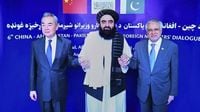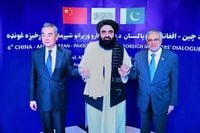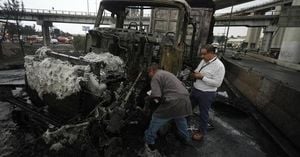In a striking display of regional diplomacy, top diplomats from Pakistan, China, and Afghanistan convened in Kabul on August 20, 2025, for a trilateral summit designed to strengthen political, economic, and security ties. The meeting, hosted by the Taliban government, brought together Pakistan’s Foreign Minister Ishaq Dar, Chinese Foreign Minister Wang Yi, and Afghan Foreign Minister Amir Khan Muttaqi, who were all received with official ceremony by Taliban officials upon arrival in the Afghan capital, as reported by AP and confirmed in statements from Islamabad and Beijing.
This high-level gathering, the latest in a series of trilateral dialogues, underscored the three nations’ shared ambitions—and anxieties—regarding regional stability, economic development, and the persistent threat of terrorism. According to Pakistan’s Ministry of Foreign Affairs, the summit featured “comprehensive discussions” on a broad spectrum of issues, including political, economic, and regional cooperation. The talks were, by all accounts, both sweeping and pragmatic, reflecting the complex realities facing these neighboring countries.
One of the summit’s standout outcomes was the trio’s renewed commitment to joint anti-terrorism efforts. As the region continues to grapple with extremist violence and cross-border security threats, the three sides “committed their countries to stronger anti-terrorism cooperation,” as stated by Pakistan’s foreign ministry. This sentiment was echoed by all parties, who emphasized the urgent need for coordinated action against terrorism, drug trafficking, and other transnational challenges that have long plagued South and Central Asia.
But security wasn’t the only item on the agenda. The diplomats also reaffirmed their determination to deepen collaboration in trade, transit, regional development, health, education, and culture. In a joint statement, the three countries “reaffirmed their commitment to deepening collaboration in trade, transit, regional development, health, education, culture, and combating drug trafficking,” according to the official communique from Pakistan’s Ministry of Foreign Affairs. The breadth of this pledge signals a recognition that economic prosperity and social development are inextricably linked to the region’s overall stability.
Perhaps the most concrete economic initiative discussed was the extension of the China–Pakistan Economic Corridor (CPEC) into Afghanistan. The CPEC, a flagship project of China’s Belt and Road Initiative, involves upgrading road and rail links between China’s western Xinjiang region and Pakistan’s Gwadar port on the Arabian Sea. For years, this corridor has been heralded as a potential game-changer for infrastructure, trade, and investment in the region.
The summit attendees “reaffirmed an earlier agreement to extend the China–Pakistan Economic Corridor to Afghanistan,” as per the statement from Islamabad. While details remain scarce, the extension is seen as a major opportunity for Afghanistan, which has long struggled with isolation and underdevelopment. Pakistani officials have expressed hope that expanding the corridor will not only boost trade with Central Asia but also help attract more Chinese investment—something Pakistan badly needs to revive its ailing economy.
“We are hopeful that extending the corridor to Afghanistan will boost trade with Central Asia,” said a Pakistani official, reflecting the optimism in Islamabad that increased connectivity could open new economic frontiers for all three countries. China, for its part, has been keen to stabilize its western borders and secure its investments, while also cultivating closer ties with both Pakistan and Afghanistan as part of its broader regional strategy.
The diplomatic choreography in Kabul was notable for more than just its economic ambitions. The meeting took place just over a month after Russia became the first country to formally recognize the Taliban government in Afghanistan—a move that sent ripples through international diplomatic circles. While no other country, apart from Russia, has offered formal recognition, the Taliban have nonetheless managed to engage in high-level talks with a range of nations and have established some diplomatic ties, notably with China and the United Arab Emirates.
This context is crucial. The Taliban, having returned to power in 2021, have struggled to gain international legitimacy. Yet, as the summit demonstrated, they are not isolated. Instead, they are increasingly being treated as a de facto government by their neighbors, who have little choice but to engage with those in control of Kabul. The trilateral dialogue, which last convened in May 2025 in Beijing, is part of a broader pattern of regional engagement that acknowledges the new realities on the ground—even if formal recognition remains elusive for most countries.
For Afghanistan, the summit represented both an opportunity and a challenge. On one hand, the chance to participate in substantive talks on trade, development, and security with two powerful neighbors is a diplomatic win for the Taliban. On the other, the lack of broader international recognition—and the continuing humanitarian and economic crises inside Afghanistan—means that much work remains to be done before the country can fully reap the benefits of regional cooperation.
China’s involvement is particularly significant. As the world’s second-largest economy and a key player in the Belt and Road Initiative, Beijing has both the resources and the strategic interest to drive development in the region. For China, stability in Afghanistan is critical—not only to protect its investments but also to prevent the spread of extremism into its own territory. The extension of CPEC into Afghanistan, if realized, would mark a significant expansion of China’s influence and could serve as a model for future regional infrastructure projects.
Pakistan, meanwhile, finds itself at a crossroads. Faced with economic challenges at home, Islamabad is eager to leverage Chinese investment and regional connectivity to jumpstart growth. The trilateral summit provided a platform for Pakistan to showcase its role as a bridge between China and Afghanistan, while also advancing its own interests in trade and security cooperation.
Despite the positive rhetoric, significant hurdles remain. Security concerns, political instability, and the lack of international recognition for the Taliban government all pose serious risks to the ambitious plans discussed in Kabul. Yet, the very fact that these discussions are taking place—and that they are producing concrete commitments—suggests a growing willingness among regional powers to chart their own course, regardless of Western hesitations.
As the diplomats departed Kabul, there was a palpable sense of cautious optimism. The summit may not have solved all the region’s problems, but it marked a step forward in the long, complicated process of building trust and cooperation among neighbors with a tangled history. Whether these commitments will translate into lasting progress remains to be seen, but for now, the trilateral dialogue stands as a testament to the enduring importance of regional diplomacy in a rapidly changing world.





